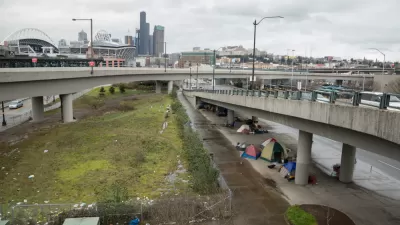'Housing first' has become a policy buzzword of sorts to describe an approach to homeless services. A pair of new reports on the homelessness situation in Seattle finds consensus on the need for a housing first policy.

Bryan Cohen reports: "Amid the hundreds of pages of data heavy, jargon-laden new reports on Seattle’s homeless crisis, there is a consensus that the city needs to dramatically shift how it spends some $50 million in annual homeless prevention funding to a so-called 'housing first' strategy."
The reports grew out of Seattle Mayor Ed Murray's Pathway Home initiative, which would "focus on housing people before providing additional services" and "[call] for the city to prioritize services towards those who have been homeless the longest, improve rapid re-housing programs to get recently homeless people into available market-rate housing, and require service providers to use a common database to better connect people to housing."
The first of the two reports, by consultant Barbra Popp, "recommends the city divest in certain transitional housing programs in favor of housing first programs while required service providers to take a more data driven, accountability-focused approach to moving people into housing." The second report, by California-based firm Focus Strategies, performed an audit of sorts on the city's current homeless services.
FULL STORY: Mayor’s reports: Seattle homeless funding should shift from transitional to permanent housing

Maui's Vacation Rental Debate Turns Ugly
Verbal attacks, misinformation campaigns and fistfights plague a high-stakes debate to convert thousands of vacation rentals into long-term housing.

Planetizen Federal Action Tracker
A weekly monitor of how Trump’s orders and actions are impacting planners and planning in America.

Chicago’s Ghost Rails
Just beneath the surface of the modern city lie the remnants of its expansive early 20th-century streetcar system.

Bend, Oregon Zoning Reforms Prioritize Small-Scale Housing
The city altered its zoning code to allow multi-family housing and eliminated parking mandates citywide.

Amtrak Cutting Jobs, Funding to High-Speed Rail
The agency plans to cut 10 percent of its workforce and has confirmed it will not fund new high-speed rail projects.

LA Denies Basic Services to Unhoused Residents
The city has repeatedly failed to respond to requests for trash pickup at encampment sites, and eliminated a program that provided mobile showers and toilets.
Urban Design for Planners 1: Software Tools
This six-course series explores essential urban design concepts using open source software and equips planners with the tools they need to participate fully in the urban design process.
Planning for Universal Design
Learn the tools for implementing Universal Design in planning regulations.
planning NEXT
Appalachian Highlands Housing Partners
Mpact (founded as Rail~Volution)
City of Camden Redevelopment Agency
City of Astoria
City of Portland
City of Laramie




























